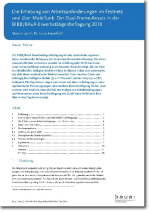- Project number: F 2453
- Institution: Federal Institute for Occupational Safety and Health (BAuA)
- Status: Completed Project
Description:
The world of work is constantly changing, strongly influenced by digitalisation, globalisation, demographic and institutional changes. These constant changes are also being reflected in the working conditions of employees and their occupational requirements. The regular BIBB/BAuA Employment Survey provides an up-to-date picture of the world of work, systematically monitors (structural) changes and trends in the world of work, and analyses the resulting consequences for occupational safety and health.
The aim of this project was therefore to analyse the 2018 BIBB/BAuA Employment Survey and its comparable predecessors. The analyses were based on the research priorities "Identification of (particularly) vulnerable groups", "Interaction of work demands, resources and health" and "Analysis of trends".
On the one hand, the analyses show that the groups of workers studied are confronted with a very wide range of challenges. For example, women are more likely than men to make sacrifices to reconcile work and family life because of their children, especially in the workplace. Second, the working conditions highlighted are distributed differently across different occupational groups. For example, while outdoor work and physical working conditions are particularly common in construction and gardening occupations, high work intensity is reported by employees in very different occupational groups (e.g., knowledge workers, logistics occupations, geriatric and nursing care).
Based on the data from the 2018 BIBB/BAuA employee survey, a Job Exposure Matrix was also developed that assigns exposure values to individual occupations for different working conditions and thus enables the identification of vulnerable groups. The Job Exposure Matrix can be obtained from the BAuA-FDZ.
Analyses of the interaction between job demands, resources, and health have shown that atypical forms of employment can pose challenges for workers. For example, employees with fixed-term contracts and temporary agency workers are more likely to report job insecurity and lower job satisfaction than employees with permanent contracts or non-temporary agency workers.
In addition, the analyses showed that high work intensity over a long period of time can pose a health risk to workers. The project has shown that women, managers, and employees in the service sector, among others, are affected by high work intensity. Furthermore, restructuring, job insecurity, poor management quality, and long working hours are particularly associated with high work intensity.
Comparative analyses of the data from 2006, 2012, and 2018 in the topic area "Work intensification and autonomy in digitalised working environments" showed across all waves that the introduction of new computer programmes and new manufacturing or process technologies is associated with increased work intensity. It was also shown that monotonous demands were less likely to be reported after the introduction of new computer programmes, but that the introduction of new manufacturing or process technologies made repetitive tasks more likely.
The results of the research project have been published in numerous papers and presentations.



